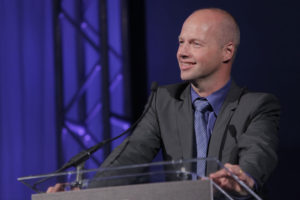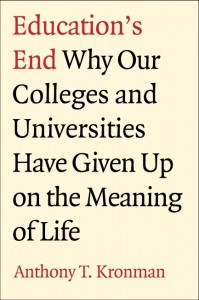The cultivation of your mind & spirit and your preparation for a job are always in tension in higher education.
With a crippling recession and the rising cost of a college degree, there seems to be a higher emphasis than ever on vocational training. But even with more internships and technical apptitude, the last half-decade of graduates are still struggling to break into the job market. Indeed, liberal arts champions are noting that narrow training for specialized jobs is leaving those students who don’t manage to land one largely unqualified to do anything else.
Broad. Specific. Enriching. Practical. Critical thinking. Hands-on learning. The best education is equal parts creativity and application, learning how to identify a problem and then trying to solve it, discovering unexpected abilities at school while refining developing ones on the job.
It is unusual for one educator to draw so much of his energy from these tensions, but that’s what Sebastian Thrun seems to be doing.

Thrun is the co-founder of Udacity, one of the young companies that is beginning to turn the bricks & mortar approach to higher education on its head. Massive open on-line courses (or MOOCs) are the vehicle. In a post a few weeks back, I discussed one of the recent directions they have taken: a collaboration between national employers like UPS and companies like Thrun’s to jointly develop “niche certification programs” that will give students an affordable shot at an available job and employers a qualified applicant pool for unfilled positions.
This could be just another way for enterprising employers to cultivate a roster of applicants for cherry picking. But from another perspective, it could be more of a win-win. As observers like Andrew Kelly have noted, most of those taking MOOCs today are either in traditional degree programs or have gotten their degrees already. Because these certificate programs are building on the broad base of a more traditional education, the too-narrowly-focused student becomes less of a concern.
For his part, Thrun seems to be motivated instead of discouraged by the vocational detour MOOC providers like his are taking.
His vision, and that of other innovators in on-line education, was to bring practical as well as enriching learning opportunities to everyone who was too poor or too busy working to pursue a traditional degree—a potentially transformative global vision. Unfortunately, very few of those sigining up for a MOOC actually complete the course today, even with “really good” teachers, regular mentoring and the promise of low-cost college credit. But the apparent fact that the market for the first wave of MOOCs is smaller than Thrun (and others) expected is only causing him to double down on his efforts to meet the broader need that’s out there.
Why is that? I think it’s because the animating principle is Thrun’s own curiosity, his own appetite for learning.
We pursue most vigorously what we embody, or as Thrun prefers to describe it, what he wants for his son.
I hope he can hit the workforce relatively early and engage in lifelong education.
Instead of four years in college, what Thrun envisions is an on-going shuttle between theory and practice, discovery and pursuit, critical detachment and engagement—exactly what he is doing to unlock the full potential of MOOCs.
It is an education that is supple enough to nurture your basic qualities of mind while also helping you to develop skills that will help you keep up with the accelerating pace of workforce change (what fellow entrepreneur and Linked-in founder Reed Hoffman calls “the continuous start-up of you”).
Watching Sebastian Thrun as a teacher, an innovator and a father is to catch a glimpse of what this vision of lifelong learning could look like for you and me.

